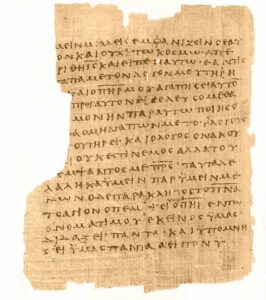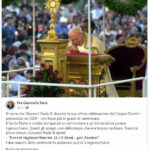A random exchange on Twitter, sparked by a retweet by Nassim Taleb that I happened to notice. I’m replying here because I think we should reclaim our spaces: if something is exemplary and can be used to make a point, it’s wasteful to push content to a platform that is at best of ephemeral nature, at worst is proactively controlling, censoring, influencing…
Here it goes:

Uhm, yes and no!

Uhm, yes and no!

Now, in this reply lies the crux of the problem.
Another installation of my renown series: “Everybody’s wrong!”
(But in different ways, and this is where the interesting details determine what you should really make of all this.)
See, the problem originates precisely with the reckless hubris showed by the cited John Wycliffe.
Basham is wrong.
To the woman (author?) in the opening, Meghan Basham, I would reply…
Can you tell me what this is?

This is a random page that I found. I cannot read it, and I’m open about it. I don’t even know from what Bible book it comes. I don’t know Greek (nor Hebrew or Aramaic, in fact). Certainly I can’t discuss the content, reconstruct the missing parts, nor do I possess sufficient information about the historical, cultural, geographical context. As a consequence I cannot compare it to other copies, i.e. manuscripts of the same book, to discuss a reconstruction of the original.
Can you really assert with certainty that you can read a random translation, possibly the translation of a translation, written by people that had a definite bias (if not an agenda) you’re unaware of, and from there infer what God wanted you to know and believe?
Additionally… If God really wanted the Bible to be perfectly clear to the casual reader, why this mess? Why having to rely on translations from multiple dead languages? Isn’t God omnipotent, hence able to give you guidance in a more straightforward fashion?
Unless this is by design, and God explicitly wanted you NOT to be able to get your guidance through a direct reading of a book!
Wikander is wrong.
(I didn’t research the personal bio of the people involved, that’s on purpose. This exchange happens on Twitter: its efficacy is based on its immediate meaning. After a quick glance most people move on, never to turn back. Anything that a poster may have meant to say, but didn’t, is irrelevant; even if they may have written a book on the subject where they say something entirely different from what is implied here. And here Wikander is defending a PhD-centric world, which is what Basham was bashing.)
Ok, granted, she’s wrong because she underestimates the complexity of the issues at hand.
But you’re ignoring another essential problem: how is this entire system meant to work? If any normal person is prevented from even hoping to get to the bottom of any issues related to their faith, because only experts know enough about the subject, then we don’t have a faith. Not a viable faith in God. At most, we have a faith in PhDs!
There are multiple problems with that:
- even if you were building a consistent and reliable corpus of teachings, you cannot really expect normal people to base their life decisions on unquestioningly accepting expert opinions coming from Academia, also considering most scholarly papers are pretty recent;
- but we’re getting in fact so many contradictory statements coming from the world of exegetes and University theologians, that you can bet all bases are covered: there’s no doctrine (!) to speak of, because any conceivable theory has authoritative proponents, that would swear by it (in fact, it’s the basis for their careers) and could provide a massive amount of citations to “support” their pet idea. When all possible interpretations are at play, there’s no actual content. At most you could draw the line at the baseline reconstruction of Jesus at least being a real historical person, who taught something and died on a cross; but even to get to this minimal result you’d have to accept some sort of academic orthodoxy and leave out the work of some extremist scholars: on what basis, if you’re not a scholar yourself? The only thing experts may all agree on is in fact the idea that only experts have a say on the subject: a caste defending their home turf.
- Of course, if you assume only scholars can chime in, you’re giving them a significant power, and they’ll exploit their privileged position. They already have all sorts of biases and perverse incentives; this includes the need to publish something new and original on a subject that is almost immutable, thus exacerbating the publish or perish problem, and greatly favoring “critical” decadent reinterpretations based on skepticism and a pathological obsession with alleged progress.
- Biblical scholars aren’t even comparable to scientists: most of what they assert with confidence is questionable at best, yet they insist on giving value to their “scientific” results that aren’t results at all. This is simply about rationalizations to justify their choices.
- And here’s the crux of the problem: once the magnitude of this issue becomes clear (#1 to 4), a Christian faith that’s so strictly dependent on the work of experts becomes an absurd proposition. It doesn’t work: that’s like… missing the target of a Revelation by a mile. You can’t really believe there’s a God behind such a state of affairs. In other words, let me rephrase that: if the Bible can only be properly understood by scholars, there’s no God. End of story. But then, as a consequences, you, a Bible Studies scholar, become pretty useless, since you spend your life studying a topic that should be thrown in the dustbin of history!
In other words, a PhD-centric vision of Biblical interpretation is a self-defeating proposition.
So…
If they’re both wrong, who’s right?
How could we solve this conundrum and properly read the Bible?
The third writer points us in the direction of the fatal, original mistake.
John Wycliffe, as a de facto father of Protestantism, wanted to inject new and arbitrary opinions in the Bible. At the same time he asserted that, through his translation, ignorant peasants could (pretend to) know more about the Scriptures than a learned priest.
This is a focal point for every mistake you can think of.
-Basham’s pretense to understand everything by reading a translation is a continuation of Wycliffe’s plowman narrative;
-A team of translators guided by Wycliffe himself would represent a reasonable approximation, for the time, to any of today’s scholarly workgroups, pushing their interpretation as authoritative.
Jesus did NOT write a book. He isn’t even quoted telling his disciples to write it. Jesus founded a community, his Church. The books are just a consequence, a useful and precious tool for the community. That’s it.
You don’t base your religious vision of life on a book! That doesn’t make any sense; a book will always be inadequate for such a task, and for obvious reasons: can you appreciate how many contrasting interpretations there are?
No, you’re just used to this “religion based on a book” idea because it’s been repeated as if it were factual for centuries, and it’s been taken for granted for too long.
A proper answer to our conundrum comes instead with the continuity that is a fundamental trait of a community that wants to preserve the treasures of their faith: a coherent and authentic interpretation of their teachings comes as a necessary consequence.
Tradition is a bad word in most modern circles, but originally this hostile attitude had no justification other than the need to stomp the traditional Catholic interpretation. A need from the viewpoint of those that, for assorted reasons, wanted to change the doctrine.
Tradition is the natural solution to our problem:
from a proper transmission of a faith, by people that absolutely want(ed) to preserve it, you get a doctrine, and a culture. Within this framework,
1. any well-intentioned scholar can find nuggets or truth, explore more thoroughly some illuminating details, helping to deepen our understanding of what was received;
2. any decently educated layperson could read and comprehend at least most of what is written, because the shared common culture helps people frame the whole content in a way that just makes sense.
Through tradition, i.e. through consistency and authenticity, both sides are right.
Once anyone tries instead to start anew, take a book in their hands and come up with answers on their own, in a vacuum, then both sides are hopelessly wrong.
The answers don’t come from scholars or private interpretation, they come from the Church!
In the proper context, 1. scholars can perform useful research, because they’re motivated to serve the entire community and be faithful to the documents as they were received, instead of serving one’s hubris, ambition, lust for novelty; 2. laypeople can have an active role in their religious education, because (if properly formed) their approach isn’t based on personal desires or expectations; rather, they know they need to follow and accept what came down.
Yes, the Church. The answer lies in the Apostolic succession.
Don’t get me wrong, there are risks and downsides to this reality. But it’s the only reasonable route, protestations from Protestants notwithstanding.
In terms of risks, well, there’s the possibility that this tradition fails to live up to expectations, and at least from a certain point on, a distorted message is passed on instead of the True Gospel.
Wait, wasn’t Jesus in person to promise Peter that such a thing would never happen?
Of course: what would be the point otherwise? If Jesus is God, there’s no point arguing about authentic interpretations eventually coming from “reformers” born many centuries after his coming.
Tradition is the only possible system to preserve the Gospel, prove me wrong!
And it requires a community, with some specific people solemnly tasked with guiding it. If the Church is something other than a merely human institution, it should be able to fulfill Jesus’ promise; if that’s not the case, Jesus failed, and that would mean he isn’t God.
In terms of downsides, well… You have to work with humans, and we’re far from perfect. Giving some people the power to become shepherds meant a fantastic opportunity for corruption, and that was and is always true, including today, especially when the Church becomes more influential in a society!
Realism means recognizing that you can’t expect the Church to live up to expectations, but alternatives are worse: some fathers of Protestantism had a point about certain scandals and corruption in Rome, but that cannot be an excuse to change the doctrine and ditch tradition.
Finally, I’ll comment on a likely objection.
I am attacking a PhD-centric exegesis and theology. Fine, one could say. What about a clergy-centric version? How is having to unquestionably follow the lead and teachings of priests any better than following scholars?
Wait! Scholars, as I said drawing on well-known facts, have multiple issues, including their expressing personal and wildly varying opinion. Nothing of that sort should happen with priests! They’re not meant to come up with allegedly better and better researched interpretations. Their role, their calling, is that of bringing forward the very same Gospel, over and over again, inserting as little as possible of their own. They’re not a source for anything: they’re good shepherds if and when they become mere conduits.
Bad priests happen. Some ages are cursed with lots of those. We’re living through one; but good, wise Christians don’t follow them, and stay put following the tradition instead. Which is hard, almost untenable: to rely on guides by design, while noticing that many of them, and in prominent positions, aren’t doing their job and are indeed leading people astray! This is a dramatic and perilous path we’re going through, full of uncertainty, and if Jesus wouldn’t eventually spare us from this agony, too many of the baptized would be lost.
But the principle remains: we’re neither meant to follow our personal opinions and desires, nor the lead of men that think all answers for humanity come from their superior minds; we’re meant to let the original message shine, as received through bishops and priests whose calling is that of confirming our faith.
After all, what makes a priest (pastor) a bad priest (pastor)?
1. The delusion that new, revolutionary research results may factually change everything.
2. The expectation to be able to personally read into the Bible a confirmation of one’s convictions.
In other words, the Path of Tradition appears less viable, these days, precisely due to bad influences that come from the opposite camp!
One things helps us get back on track: being humble.










































